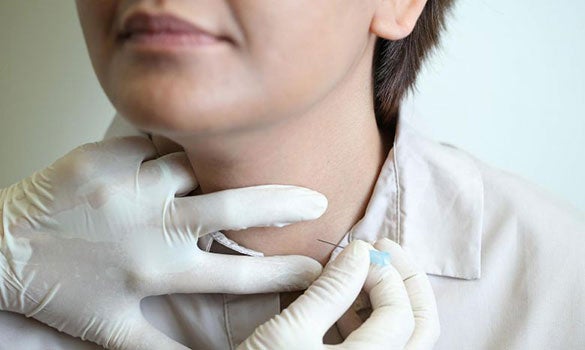HealthXchange will NEVER ask you to transfer money over a call. If in doubt, call the 24/7 ScamShield helpline at 1799, or visit the ScamShield website at www.scamshield.gov.sg.
Thyroid disorders can be managed with diet, exercise

is a gland at the base of the neck, and the thyroid hormone regulates our body's metabolism. PHOTO: ST FILE
The thyroid is a gland at the base of the neck, and the thyroid hormone regulates our body's metabolism. PHOTO: ST FILE
Women are five times more likely to get thyroid disorders than men.
Of such disorders, hypothyroidism and hyperthyroidism are the two most common in women between the ages of 20 and 50 here.
The thyroid is a gland at the base of the neck, and the thyroid hormone regulates our body's metabolism.
Hyperthyroidism occurs when too muchof the hormone is produced by an overactive gland. This speeds up the body's metabolism and can cause sudden weight loss.
Hypothyroidism occurs when an underactive gland produces too little of the hormone. Your body's metabolism is, thus, slowed, and you may gain weight.
Other disorders include goitre or an enlarged gland, thyroid nodules and thyroid cancer.
It is not known why women are more likely to get such diseases, said Dr Chng Chiaw Ling, a senior consultant at the Department of Endocrinology at Singapore General Hospital. But factors such as pregnancy, stress and autoimmunity may contribute to this, she added.
Dr Chng discusses the use of diet and exercise in the management of thyroid disorders.
DIET
While hyperthyroidism often leads to weight loss, there is not a particular type of food that can help.
Instead, patients who have this condition should avoid taking too much food containing iodine, such as seafood. Until their condition is controlled, they should also avoid drinking too much caffeinated beverage or doing vigorous exercise, as these may worsen the symptoms of palpitations and a fast heart rate.
IODINE SUPPLEMENTS
Our thyroid needs iodine - which we get from the food we eat - to function properly.
Iodine deficiency can cause hypothyroidism, but this deficiency is rare in developed countries such as Singapore, where iodine-rich foods, such as seafood and seaweed, are abundant.
Iodine supplements may help to prevent the condition only when one's diet contains little iodine.
Some people believe that consuming extra iodine will improve their thyroid health. However, most Singaporeans have no problem getting enough iodine.
Taking iodine supplements can actually do your thyroid more harm than good, as excessive iodine may trigger thyroid dysfunction or worsen pre-existing hyperthyroidism.
EXERCISE
Having a thyroid condition does not mean that you cannot work normally, have a family or enjoy any activity that interests you.
While strenuous exercise may be temporarily avoided in patients who have uncontrolled hyperthyroidism, patients who are being monitored should follow a healthy lifestyle and exercise regularly.
Get the Health Buddy App
© 2025 SingHealth Group. All Rights Reserved.













 Get it on Google Play
Get it on Google Play